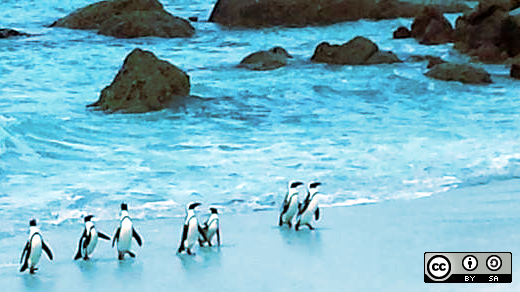My late father, Lou Shapiro, was an early leader of UNICEF, so relief work was baked into the genetics of my family. His work was centered on emergency relief for the survivors of earthquakes and other natural disasters. Whenever there was an earthquake in the world, I knew dad would be coming home late from work—and I was so proud that some family experiencing trauma would be sleeping in a dry tent, with warm blankets and clean water, because of my dad's work. Following in my father's footsteps, my own relief work has been centered on digital inclusion—and open source is the tool I turn to most often.
Let me share two stories with you in that regard. In April, a young dad visited the public library where I work. He appeared interested in using the public computers our library offers. It turns out someone had stolen his family's only computer, a Macbook, and his tax return was due that day. When I learned about his predicament, I asked, "Would you like to borrow a Linux laptop until your family buys another laptop?" He perked up and asked, "Does this library lend laptops?" I replied, "The library doesn't, but I do. You can bring this back to me after you're done with it."
I purposely didn't ask him for his phone number. His trust had been betrayed and it was vital for this nice community member to be now bathed in trust. He asked me, "How do I return the laptop?" My answer: "You walk up to me and hand it to me when you're done using it. Here is my email address, in case you have any questions about it."
On that difficult day for him, he experienced Linux as the face of kindness. He might have never used a Linux computer before, but here was his opportunity to do so. Maybe this Linux laptop was the silver lining to his stolen Macbook setback? He returned the Linux laptop promptly and gratefully after his family had saved money to buy a replacement laptop—about a month later. Linux saved the day. It wasn't me who saved the day—I was just the delivery vehicle for Linux.
Another community resident recently called me frantically, "My Windows desktop computer stopped working. I need to be online and I don't have money to buy a replacement." My answer: "Let me stop by after work and loan you the Linux desktop I have in the trunk of my car. I'll find you a donated Windows desktop, but it's going to take me about a month or so." I was able to find her a nice donated Windows 10 desktop and the Linux loaner suited her needs very well during the interim. I loved her comment to me when she returned the Linux loaner: "I loved exploring Linux and except for the fact that Linux doesn't run Hulu. I'd gladly switch from being a Windows user to being a Linux user."
My reply to her was, "I want you to use the computer that works best for your needs, whether that be a Windows computer, a Linux computer, or something else." I don't want folks to use Linux if that's not the best computer for their needs. While she was borrowing the Linux loaner computer, she sent me several very interesting technical questions about Linux. That Linux loaner computer served its purpose well. It tided her over while allowing her to explore Linux as a possible option for her own needs.
When people are experiencing hardship in their lives, I try to lessen their burden using refurbished Linux desktops and laptops. I say, let them experience Linux as the face of kindness. For some, they can experience this kindness as a simple act of kindness. For others, it may open new doorways of opportunities in their lives. And then they themselves might choose to offer Linux as the face of kindness.
If you'd like to give this kind of thing a try, here are a few tips. Even though it will slightly reduce the fuel efficiency of your car, I suggest carrying a spare Linux desktop (or laptop) in the trunk of your car, ready to lend out on short notice. Somebody, somewhere will be immensely grateful that you anticipated their need—in the same way that UNICEF anticipates the need of earthquake survivors. Go the extra mile and bundle in a page or two of helpful instructions, if you feel so inclined. Place the most useful applications as icons on the desktop. Make sure you install TuxPaint, because the loaner computer might be used by young kids who would find that software immensely enjoyable. Bundle in an optical mouse. Don't forget to tell the recipient the computer system password.
And if you don't own a car, find a Linux buddy to work together on such a project. The dividends from such a project can be emotionally lucrative. And if the world has greater kindness as a result, we all could live with that. Let a wave of kindness wash across the world. Who knows what it will wash away.







10 Comments